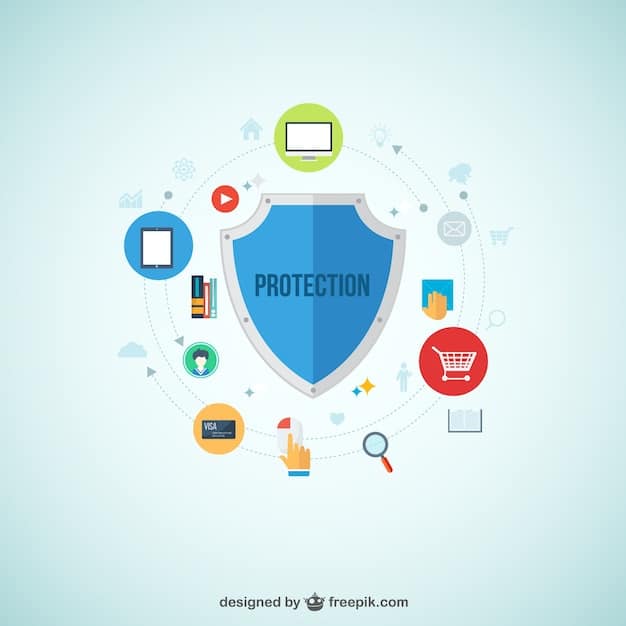Protect Your Assets: Legal Guide for US Online Businesses

Protecting your assets is crucial for US online businesses, involving legal structures, intellectual property, and insurance to safeguard against liabilities and ensure long-term financial security.
Starting and running an online business in the US is exciting, but it’s also essential to think about how to protect your assets: essential legal considerations for US online businesses. This involves everything from choosing the right business structure to securing your intellectual property and having the proper insurance coverage.
Why Asset Protection Matters for Online Businesses
Protecting your business assets is one of the most important things you can do as an online business owner. It helps ensure the long-term stability and success of your company by safeguarding against potential legal liabilities, financial risks, and other unforeseen challenges.
Mitigating Legal Liabilities
Online businesses can be vulnerable to lawsuits and legal claims. Protecting your assets can limit your personal liability if your business is sued.
Ensuring Financial Security
Asset protection helps to preserve your business’s financial stability. By shielding assets from creditors and legal judgments, you ensure your business can continue to operate and thrive even in challenging circumstances.

- Shielding Personal Assets: Properly structured asset protection can prevent personal assets from being at risk in case of business debts or lawsuits.
- Protecting Intellectual Property: Safeguarding your trademarks, copyrights, and patents ensures that your innovative ideas and creations remain protected.
- Maintaining Business Continuity: Having protective measures in place allows your business to continue operations smoothly, even when facing legal or financial challenges.
In conclusion, effective asset protection is not just a precautionary measure but a vital strategy that underpins the sustainability and resilience of your online business in the US.
Choosing the Right Business Structure
Selecting the correct business structure is a fundamental step in protecting your assets. The structure you choose will affect your liability, taxes, and how you manage your business.
Sole Proprietorship
A sole proprietorship is the simplest form, where the business is owned and run by one person. It’s easy to set up, but it offers no legal separation between the owner and the business.
Limited Liability Company (LLC)
An LLC provides a level of personal liability protection. The owner’s personal assets are typically shielded from business debts and lawsuits.
Corporation (S Corp or C Corp)
Corporations are more complex but offer the strongest protection. They are separate legal entities, completely distinct from their owners. S Corps offer pass-through taxation, while C Corps are subject to corporate income tax.

- Evaluate Liability Risks: Consider the potential liabilities associated with your online business.
- Assess Tax Implications: The chosen structure can have significant tax consequences.
- Consider Future Growth: Select a structure that will scale with your business as it grows.
In summary, choosing the right business structure is a critical decision that can significantly impact how well your personal and business assets are protected.
Protecting Intellectual Property
Intellectual property (IP) is often one of the most valuable assets of an online business. Protecting your IP helps maintain a competitive edge and prevents others from using your creations without permission.
Copyrights
Copyrights protect original works of authorship, including website content, blog posts, and digital products. Registering your copyright can provide additional legal protection.
Trademarks
Trademarks protect brand names, logos, and other symbols that identify your business. Properly registering a trademark can prevent others from using similar marks that could confuse customers.
Trade Secrets
Trade secrets encompass confidential information that gives your business a competitive edge. Ensure these secrets are well-protected through NDAs and strong internal policies.
Securing your intellectual property is essential for maintaining your brand identity and competitive advantage in the online marketplace.
Insurance Coverage for Online Businesses
Having the right insurance coverage is essential for protecting your online business from potential risks. Policies can help cover costs associated with lawsuits, property damage, and other unexpected events.
General Liability Insurance
General liability insurance covers bodily injury and property damage caused by your business operations. It’s a broad policy that provides essential protection.
Professional Liability Insurance (Errors & Omissions)
If your online business provides advice or services, professional liability insurance protects you from claims of negligence or errors in your services.
Cyber Liability Insurance
With the increasing risk of cyberattacks, cyber liability insurance can cover costs associated with data breaches, including legal fees, customer notification, and credit monitoring.
Investing in appropriate insurance policies is a prudent step toward protecting your business from various liabilities and ensuring its long-term stability.
Contractual Agreements
Well-drafted contracts are vital for managing relationships with customers, suppliers, and employees. Clear and comprehensive agreements can minimize disputes and protect your business interests.
Terms of Service
Your website’s terms of service (TOS) outline the rules and guidelines for using your site. They should address issues like user conduct, intellectual property, and limitations of liability.
Privacy Policy
The privacy policy informs users about how you collect, use, and protect their personal information. Compliance with privacy laws is essential to avoid legal issues.
Vendor Agreements
Vendor agreements detail the terms and conditions of your relationships with suppliers and service providers. They should cover aspects like payment terms, deliverables, and confidentiality.
- Clarity and Specificity: Ensure that all contracts are clear, specific, and leave no room for ambiguity.
- Legal Review: Have contracts reviewed by an attorney to ensure they are legally sound and enforceable.
- Regular Updates: Update contracts periodically to reflect changes in laws and business practices.
In conclusion, well-structured contractual agreements form a legal backbone for your online business, safeguarding your interests and promoting smooth interactions with all stakeholders.
Compliance with Laws and Regulations
Navigating the legal landscape is an ongoing process for online businesses. Staying informed about relevant laws and regulations helps to ensure your business operates ethically and legally.
Data Protection Laws
Comply with data protection laws like GDPR and CCPA if you collect personal information from users. These laws require transparency and consent regarding data usage.
Advertising Regulations
Adhere to advertising regulations set by the FTC, including truth-in-advertising standards. Ensure your marketing claims are accurate and substantiated.
Accessibility Standards
Make your website accessible to individuals with disabilities by following guidelines like WCAG. Compliance with accessibility standards is not only good practice but also legally required in many cases.
Staying up-to-date with legal and regulatory changes is vital for maintaining a compliant and reputable online business.
| Key Point | Brief Description |
|---|---|
| 🛡️ Business Structure | Choose the right structure (LLC, Corp) to protect personal assets. |
| ©️ Intellectual Property | Copyrights and trademarks safeguard your brand and content. |
| ☂️ Insurance | Get liability, professional, and cyber insurance for robust protection. |
| 📜 Contracts | Use clear terms of service, privacy policies, and vendor agreements. |
FAQ
▼
Choosing the right business structure is crucial because it affects your personal liability, taxes, and administrative burden. LLCs and corporations usually provide better liability protection than sole proprietorships.
▼
You can protect your intellectual property by registering copyrights for your original content, trademarks for your brand name and logo, and keeping trade secrets confidential. Use NDAs when sharing proprietary information.
▼
Online businesses should consider general liability insurance, professional liability insurance (errors and omissions), and cyber liability insurance. The specific needs depend on the nature and risks of the business.
▼
Your terms of service should include rules for user conduct, intellectual property rights, limitations of liability, and dispute resolution mechanisms. It should clearly outline the agreement between your business and its users.
▼
Data protection laws like GDPR and CCPA require you to be transparent about how you collect, use, and protect personal data. You need to obtain consent for data collection and provide users with rights over their data, such as access and deletion.
Conclusion
Protecting your assets as a US online business involves several key legal considerations. By choosing the right business structure, safeguarding your intellectual property, securing appropriate insurance coverage, and complying with relevant laws and regulations, you can mitigate risks and ensure long-term success.





